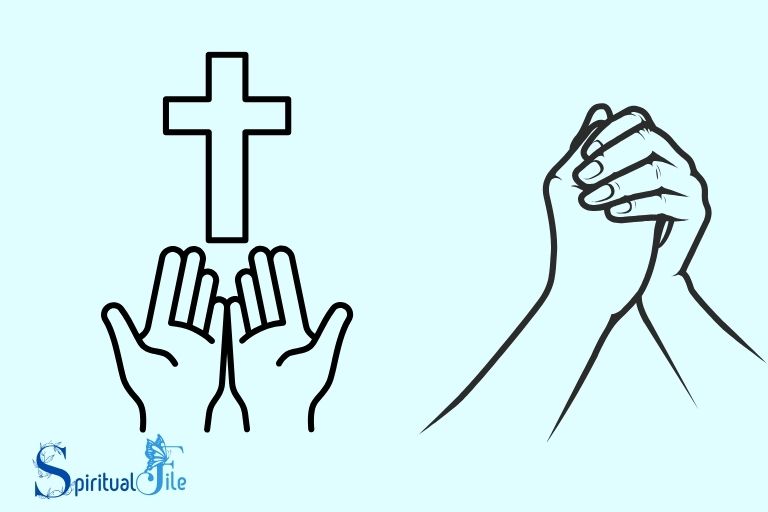Examples of Spiritual Courage: Fears!
Spiritual Courage refers to the ability to maintain faith and belief in spite of doubts, fears, and adversities.
This could involve standing up for one’s beliefs, maintaining personal integrity in the face of opposition, or seeking spiritual growth through self-examination and personal transformation.
Spiritual courage can take many forms, depending upon individual beliefs and values. For a religious person, this might include standing up for their faith even when it’s unpopular or difficult.
For a non-religious person, spiritual courage could involve seeking truth and wisdom outside of conventional norms, or confronting personal fears and anxieties to foster personal growth and self-understanding.

Key Takeaway
8 Examples of Spiritual Courage
| Example | Description |
|---|---|
| Practicing Forgiveness | This can be a true act of spiritual courage, as it often means letting go of resentment and anger, even when the person who has wronged you doesn’t deserve forgiveness. |
| Seeking Truth | This involves the courage to ask deep, meaningful questions, to seek answers beyond surface level, and to question one’s own beliefs and assumptions. |
| Maintaining Integrity | It requires courage to stick to one’s moral principles, when it would be simpler and easier to compromise them. |
| Surrendering Control | Spiritual courage is often shown when people are able to let go of their need to control everything, trusting in a higher power or the natural flow of life instead. |
| Facing Fear | By acknowledging and facing fears, individuals display spiritual courage, whether the fear is of death, the unknown, or anything else intangible. |
| Serving Others | Putting others’ needs before one’s own, especially in difficult circumstances, can also be an act of spiritual courage. |
| Embracing change | This involves the courage to accept life as an ever-changing flow and the ability to evolve and grow with these changes. |
| Practicing Non-Attachment | The courage to let go of attachments, expectations and desire for certain outcomes shows high levels of spiritual bravery. |
Understanding Spiritual Courage
Uncover acts of spiritual courage by individuals who embrace challenges beyond the ordinary, demonstrating remarkable strength in the face of adversity.
From speaking up for justice to facing personal fears head-on, these examples inspire us to find our own spiritual strength.
What Is Spiritual Courage?
- Definition: Spiritual courage refers to the ability to confront and overcome fear, doubt, and adversity in order to align one’s actions and beliefs with one’s spiritual values and beliefs.
- Inner strength: It involves tapping into one’s inner strength to make choices that honor one’s spiritual convictions, even in the face of opposition or challenges.
- Authenticity: Spiritual courage encourages individuals to live authentically, staying true to their spiritual principles, and embracing vulnerability as they navigate their spiritual journey.
- Soul growth: It is a catalyst for personal growth and transformation, pushing individuals to delve deeper into their spirituality, question societal norms, and pursue meaningful connections with the divine.
Why Is Spiritual Courage Important?
- Living fulfillingly: Spiritual courage empowers individuals to live a fulfilling life in alignment with their deepest spiritual beliefs, values, and purpose.
- Overcoming fear: It enables individuals to overcome fear and step out of their comfort zones, allowing for spiritual growth and expansion.
- Building resilience: Spiritual courage fosters resilience, helping individuals bounce back from setbacks and remain steadfast in their spiritual journey, even during challenging times.
- Inspiring others: Displaying spiritual courage can inspire others to embrace their own spirituality, creating a ripple effect of positive change in the world.
How Does Spiritual Courage Differ From Other Forms Of Courage?
- Soul connection: While other forms of courage primarily focus on physical or emotional strength, spiritual courage stems from a deep connection with one’s soul, values, and higher power.
- Transcending limitations: Spiritual courage extends beyond individual limitations, reaching into the realm of faith and transcendence, allowing individuals to tap into a higher power for guidance and support.
- Inner transformation: It often involves inner transformation and growth, as individuals face their fears, confront limiting beliefs, and expand their consciousness.
- Broader impact: While personal courage may impact oneself or immediate circumstances, spiritual courage has the potential to create a broader impact on spiritual communities and the collective consciousness.
Overall, spiritual courage is a transformative force that empowers individuals to live in alignment with their spiritual beliefs, embrace vulnerability, overcome fear, and create positive change in both their personal lives and the world around them.
Historical Examples Of Spiritual Courage
Throughout history, there have been numerous powerful instances of individuals displaying spiritual courage in the face of adversity, inspiring others to overcome personal challenges and pursue their spiritual growth.
These examples serve as a testament to the strength and resilience of the human spirit.
Mahatma Gandhi’s Nonviolent Resistance:
- Mahatma gandhi, the influential leader of the indian independence movement, demonstrated spiritual courage through his commitment to nonviolent resistance.
- Gandhi’s philosophy of nonviolence, also known as satyagraha, was rooted in his spiritual beliefs and sought to confront injustice through peaceful means.
- Through acts of civil disobedience, such as the salt march and fasting, gandhi inspired a nation to stand up against british colonial rule.
- His unwavering commitment to nonviolence and his ability to mobilize millions of people in a peaceful manner earned him the respect and admiration of people worldwide.
- Gandhi’s spiritual courage served as a powerful example of how peaceful resistance can bring about significant social and political change.
Martin Luther King Jr.’s Leadership During The Civil Rights Movement:
- Martin luther king jr., the iconic leader of the civil rights movement in the united states, exemplified spiritual courage through his unwavering commitment to equality and justice.
- King advocated for the rights of african americans using nonviolent methods, inspired by the principles of mahatma gandhi.
- His powerful speeches, including the famous “i have a dream” speech, galvanized the american public and brought attention to the systemic racism and segregation that plagued the country.
- Despite facing violence, intimidation, and opposition, king and his followers remained nonviolent and peaceful in their protests, showing immense spiritual strength.
- King’s leadership and courage ultimately led to the passage of the civil rights act of 1964 and the voting rights act of 1965, marking significant milestones in the fight for racial equality.
Malala Yousafzai’s Fight For Girls’ Education:
- Malala yousafzai, a pakistani activist and nobel prize laureate, demonstrated exceptional spiritual courage in her fight for girls’ education.
- At a young age, malala defied the taliban’s ban on girls attending school and spoke out against their oppressive regime.
- Despite facing multiple assassination attempts, malala continued to advocate for girls’ education, believing in the power of knowledge to transform lives.
- Her activism led to international recognition and inspired millions around the world to support the right of every child, regardless of gender, to receive an education.
- Malala’s unwavering dedication to her cause and her courage in the face of adversity make her an incredible example of spiritual strength and resilience.
While there are countless examples of spiritual courage throughout history, mahatma gandhi, martin luther king jr. , and malala yousafzai stand out as prominent figures who fearlessly fought for their beliefs, using nonviolence and education as powerful tools for change.
Their unwavering commitment to their causes serves as an inspiration, reminding us that true courage lies in standing up for what is right, even in the face of immense challenges.
Cultural Examples Of Spiritual Courage
Cultural examples enrich our understanding of spiritual courage, demonstrating individuals who fearlessly embrace their beliefs and values, defying societal norms and expectations.
Whether it’s the dalai lama’s unwavering commitment to nonviolence or nelson mandela’s resilience during his years in prison, these examples inspire us to courageously follow our own spiritual paths.
Indigenous Peoples Preserving Their Traditions
- Indigenous cultures around the world have demonstrated immense spiritual courage by preserving their time-honored traditions in the face of colonization and cultural assimilation.
- By safeguarding their customs, languages, and ancestral knowledge, indigenous peoples assert their spiritual identities and resist the erasure of their cultural heritage.
- Native american tribes such as the navajo, hopi, and inuit continue to celebrate sacred ceremonies, perform traditional dances, and pass down ancient wisdom to future generations.
- The maori people of new zealand uphold their cultural practices, including the haka dance, to maintain a strong connection to their spiritual beliefs and honor their ancestors.
- Through their resilience and determination, indigenous communities exemplify spiritual courage in the preservation of their rich cultural legacies.
Lgbtq+ Individuals Embracing Their Identities
- Lgbtq+ individuals demonstrate remarkable spiritual courage by embracing their authentic identities and navigating the complexities of self-acceptance within their religious or spiritual communities.
- Many lgbtq+ individuals face challenges reconciling their sexual orientation or gender identity with traditional religious teachings that may condemn or exclude them.
- Despite these obstacles, countless lgbtq+ individuals find strength in affirming and celebrating their true selves, often forging inclusive spaces within their faith communities.
- Lgbtq+ activists within religious organizations advocate for greater acceptance and inclusion, fostering dialogue and understanding between the lgbtq+ community and faith-based communities.
- By courageously claiming their rightful place within spirituality, lgbtq+ individuals challenge existing norms and inspire others to embrace their own unique spiritual journeys.
Artists Expressing Their Spiritual Beliefs Through Their Work
- Artists across generations and cultures have exhibited spiritual courage by fearlessly expressing their beliefs and experiences through their creative endeavors.
- Through various art forms such as painting, sculpture, music, and literature, artists transmit profound spiritual messages and explore the depths of their souls.
- Visionary painters like salvador dali and frida kahlo infused their art with symbolic representations of their spiritual visions and personal struggles.
- Musicians like bob marley and nina simone utilized their music as a medium to convey spiritual messages of love, unity, and social justice.
- Writers such as rumi, khalil gibran, and maya angelou have masterfully shared their spiritual insights through poetry, inspiring readers with their profound wisdom and contemplations.
These cultural examples of spiritual courage stand as powerful testaments to the resilience, authenticity, and transformative power of the human spirit.
FAQ About Examples Of Spiritual Courage
What Is The Spiritual Courage?
Spiritual courage refers to the inner strength and bravery required to explore and connect with one’s spiritual beliefs and journey.
It involves stepping out of one’s comfort zone and confronting challenges to develop a deeper understanding of oneself and the world.
This courage allows individuals to question traditional beliefs, embrace uncertainty, and seek enlightenment.
By cultivating spiritual courage, individuals gain the resilience to face adversity, embrace growth, and embark on a transformative journey of self-discovery and personal growth.
It enables them to transcend their fears, doubts, and limitations, ultimately leading to a sense of liberation, inner peace, and connection to a higher purpose.
Spiritual courage empowers individuals to live authentically, align their actions with their beliefs, and create a meaningful and fulfilling life.
What Is An Example Of Social Courage?
An example of social courage is standing up for someone who is being bullied. Another example is speaking out against injustice or discrimination.
Taking a stance against popular opinion or challenging societal norms can also be considered social courage. It requires bravery and a willingness to face potential backlash or criticism.
Speaking up for those who don’t have a voice or advocating for positive change in the community also demonstrate social courage. This kind of courage can inspire others and create a ripple effect of positive social change.
What Is An Example Of Intellectual Courage?
Intellectual courage can be exemplified by challenging established ideas or voicing controversial opinions.
For instance, scientists who challenge conventional theories despite potential backlash demonstrate intellectual courage. This kind of bravery is often witnessed in the field of scientific research.
Additionally, scholars who question societal norms or challenge prevailing beliefs also exhibit intellectual courage.
By raising unpopular but thought-provoking questions, these individuals make intellectual progress possible.
Moreover, artists and writers who fearlessly explore new artistic forms or present unconventional ideas exhibit intellectual courage as well.
This fearless pursuit of innovation keeps creative disciplines vibrant and pushes boundaries.
Overall, intellectual courage involves the willingness to go against the grain and challenge commonly accepted ideas for the sake of intellectual growth and progress.
What Are The Two Types Of Courage?
There are two types of courage: physical courage and moral courage. Physical courage involves facing physical danger or taking physical risks.
It requires bravery and the ability to overcome fear when facing a dangerous situation.
Examples of physical courage could include performing in extreme sports, saving someone from a burning building, or joining the military.
On the other hand, moral courage is the courage to stand up for what is right, even when it is difficult or unpopular. It involves speaking out against injustice, defending one’s values, or challenging authority when necessary.
Moral courage often requires taking risks, as it may involve going against societal norms or facing backlash.
Examples of moral courage could include whistleblowing, advocating for marginalized groups, or speaking out against discrimination.
Both types of courage are important and can be displayed in different contexts and situations.
What Is Spiritual Courage And Why Does It Matter?
Spiritual courage is the inner strength to face adversity, stay true to one’s values, and find meaning in challenging times.
Conclusion
Examples of spiritual courage remind us of the extraordinary power within each individual to face adversity and embrace personal growth.
These examples demonstrate the unwavering determination and strength required to navigate life’s challenges.
By looking inward and connecting with our spiritual selves, we can find the courage to confront our fears, break through barriers, and pursue our passions with conviction.
Whether it is standing up for one’s beliefs in the face of opposition, forgiving those who have wronged us, or embracing vulnerability in order to create deeper connections, spiritual courage enables us to live authentically and align with our higher selves.
It is a force that lies within all of us and can be nurtured through self-reflection, self-care, and a willingness to face our deepest truths.
As we cultivate spiritual courage, we not only enhance our individual lives, but also contribute to a more compassionate and loving world.






